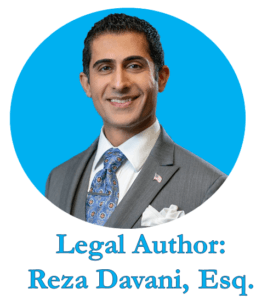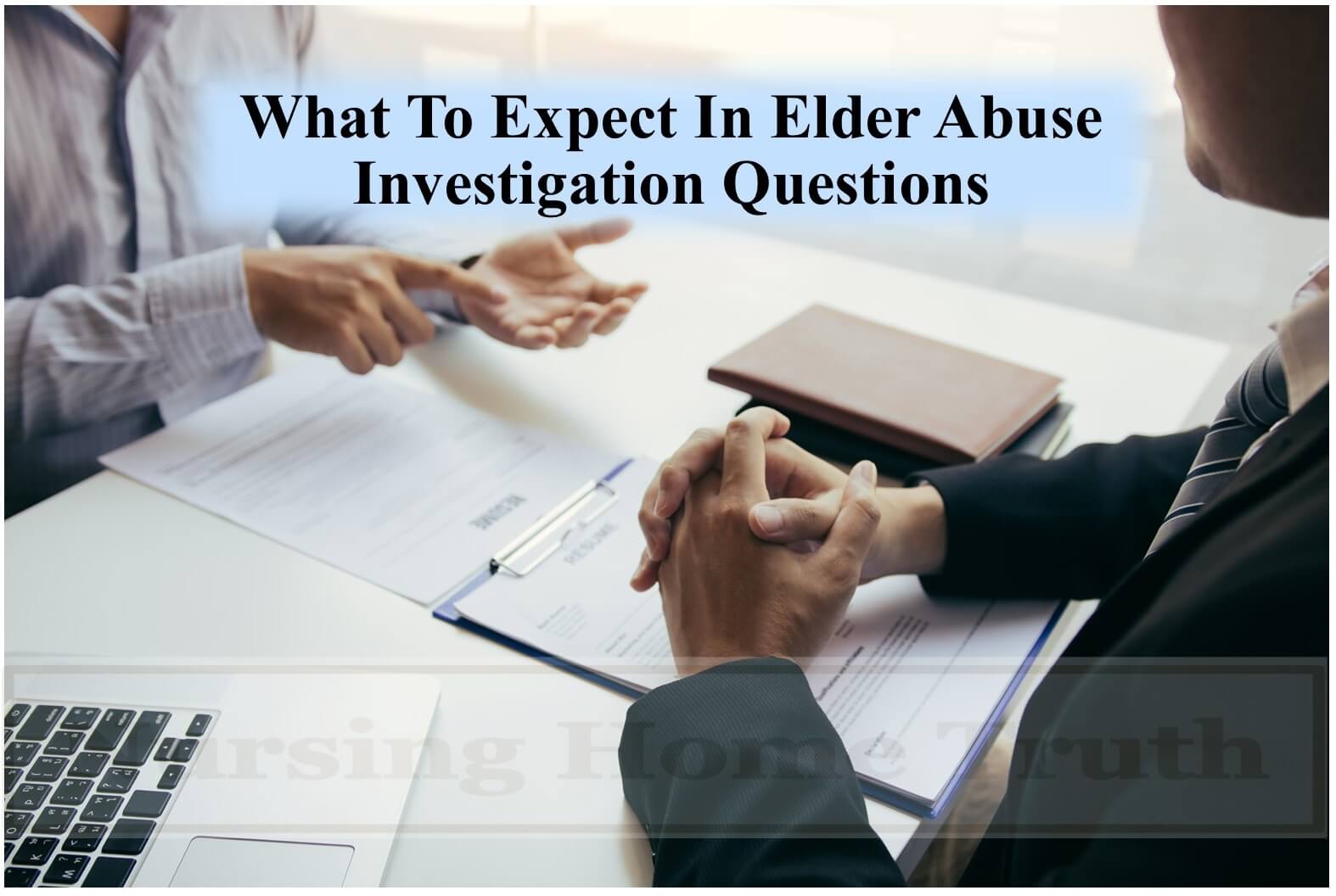Article Updated: March 9, 2022
Elder Abuse Investigations
You have a feeling. You know something is wrong. Your loved one is acting different, weird, reclused. What do you do?
I’ll give you some ideas in this article. Work through flushing out what could be going on. If you find red flags, or worse, discover physical injuries, you may need legal help to stop the harm and seek justice for what was done.
I hope my legal analysis helps you. If you need more help after reading this, call me or send me an email.
Clickable Table of Contents
Elder Abuse Investigation
1 – Elder Abuse Investigations
2 – Overview Of Elder Abuse Investigation Questions
3 – Elder Abuse Questions To Ask
4 – Elder Abuse Investigation Q&A
Resources
5 – Get Help Understanding Elder Abuse Investigation Questions
6 – Supporting Literature, Citations & Research
7 – About the Author
8 – Legal Help in Maryland & Nationally
Elder Abuse Investigations
Thousands of individuals in nursing homes, assisted care living, or even living with their own families, are abused every single year.
Elder abuse investigation questions exist to help you better understand what an elderly individual is going through and to help identify when they are in need of help.
These questions focus on a variety of types of abuse ranging from willful deprivation, sexual abuse, financial abuse and emotional abuse.
The main purpose of an elder abuse investigation is to uncover any possibility that abuse is taking place.
To accomplish this goal, a variety of questions will be asked related to issues such as:
◊ Deprivation of access to water or food
◊ Being threatened or intimidated
◊ Being touched without consent
◊ Having medications withheld
◊ Being denied hearing aids or glasses
◊ Having money taken by force or coercion
If there is the belief that someone is being abused they can expect questions related to issues like these to be asked of them.
When Are Elder Abuse Investigations Needed?
Investigations into elder abuse are needed anytime abuse of any form is suspected. These suspicions can be brought up by family members, friends, nurses, or anyone who has contact with an elderly individual.
The main driver of an investigation is when there is the belief that abuse is taking place.
If you see that an elderly individual is showing signs of distress it can be an indication of abuse which can warrant an investigation.
Elder abuse can come in various forms, and even those who are responsible for ensuring the safety of elderly people, like health care professionals, can be responsible for elder abuse taking place.
Families are also often responsible for elder abuse and factors such as sociocultural context and victim-perpetrator relationship can make a difference in abuse occurring.
Investigations into elder abuse can therefore be needed in almost any setting, instance or situation.
Who Triggers An Elder Abuse Investigation?
So, can anyone trigger an elder abuse investigation? Yes, actually, anyone who suspects that elder abuse is taking place, has the ability to contact the proper authorities and help trigger an investigation into potential abuse.
An investigation into elder abuse allegations showed that in many cases, multiple abusers (18.2%) are identified in a single case against an elderly individual and multiple types of abuse (23%), i.e. financial, emotional, physical, take place.
The most frequent combination found was physical abuse coupled with more kind of abuse (65.6%) showing that if physical abuse is present, it is very likely that additional non-physical forms of abuse are also taking place.
The most commonly identified perpetrators of abuse against an elderly person is their own family members which means that the people most likely to identify and trigger an investigation will be other family members, or potentially doctors, nurses and therapists who have contact with the elderly individual.
Overview Of Elder Abuse Investigation Questions
There are common elder abuse investigation questions that you can expect in almost any investigative process.
These questions aim to cover the main areas of abuse that typically take place against an elderly individual.
The major areas are:
◊ Financial
◊ Emotional
◊ Sexual
◊ Physical
Under these broad categories there are a number of questions that can potentially be asked to further understand the unique situation that surround the investigation.
What Purpose Do Elder Abuse Investigation Questions Serve?
Elder abuse investigations have one major purpose, and this is to uncover if there is any possible abuse going on.
In some cases looking for wider or more systematic abuse may be looked, for, such as in a care home or assisted living facility.
Most other cases will be looking to assess whether one single individual is the victim of abuse in just their own life.
It is also possible however that an investigation into one abuse case can lead investigators into uncovering a wider chain of abuse as well.
What Kinds Of Questions To Expect
The major kinds of questions that will be asked can generally be broken down into 4 segments. These are:
◊Financial
◊Emotional
◊Physical
◊Sexual
Each of these will have many questions that can be asked to better understand what is happening in the life of the elderly individual in question.
For example, questions about financial abuse can include:
◊ Has anyone used your credit card without permission?
◊ Have you noticed money leaving your account unexpectedly?
◊ Are you having trouble making your monthly payments?
On the other hand, questions about sexual abuse can include questions like:
◊ Has anyone touched you without your permission?
◊ When you are changing or in the bath, has anyone taken photos of you?
What is most important about these questions is that they help reveal potential abuse to the person who is conducting the investigation.
Elder Abuse Questions To Ask
What are the best elder abuse questions to ask in an investigation?
This depends on the type of abuse you believe is taking place and can include a number of questions that have been tried and tested in previous abuse investigation.
Examples of questions that have been used in the past are listed below and can give you insight into the specific kinds of questions that may be asked in your investigation.
Financial Abuse Investigative Questions
- Does your caregiver rely on you for shelter or financial support?
- Has money been stolen from you?
- Do you notice less money in your account?
- Has anyone forced you to sign strange papers?
- Has anyone forced you to give them money?
Emotional Abuse Investigative Questions
- When you and your caregiver disagree on something, what happens?
- Do you ever feel lonely and alone?
- When you and your caregiver disagree or argue, are you given the silent treatment?
- Has someone talked to you in a threatening manner?
- Have you ever been threatened with punishment if you did not listen to them?
- How about being threatened with deprivation (food, medicine), given threats that you will be institutionalized if you do not listen?
Physical Abuse Investigative Questions
- Is there anyone at home you are afraid of?
- Has anyone slapped, struck, kicked or punched you?
- Have you been tied down or locked in a room?
- Has anyone touched you without your consent or hit you?
Neglect Investigative Questions
- Do you need vital things that are being kept from you, like hearing aids, reading glasses or dentures?
- Have you been left alone for long periods of time?
- If you are in need of help, can you tell me how you get it?
- Has anyone limited your daily activities?
Elder Abuse Investigation Q&A
Which elder abuse questions to ask are most important if I think my loved one is being abused?
If you believe that your loved one is being abused, it is important to understand the distress signs they are showing, because this can help you understand which questions are most relevant and therefore important to ask. It is also highly possible that if there is any form of abuse, then more than one kind is present. Therefore, asking all possible abuse investigative questions will be important.
What purpose do elder abuse questions serve?
These questions are broken down along broad categories and serve to understand and uncover abuse that may be going on in the life of an elderly individual.
Who can trigger an elder abuse investigation?
Anyone who believes that abuse is taking place can trigger an elder abuse investigation which will lead to questions being asked of the elderly person in question.
What are the kinds of elder abuse investigation questions that can be asked?
Generally, there are a few broad categories of questions that can be asked including questions related to: sexual abuse, financial abuse, emotional abuse and physical abuse.
Get Help Understanding Elder Abuse Investigation Questions
If you believe any elderly person in your life is suffering abuse of any form, you may want to trigger the abuse investigation process.
This process can be stressful and many questions will be asked in the ensuing investigation.
If the suspected abuse caused a substantial physical injury, and was caused by a medical facility or medical provider, then the victim may be entitled to compensation. For a free consultation, send a private message through the contact form on this page, email me directly, or call my direct line.
Warmly,
Reza Davani, Esq.
State Bar No.: 1212110211
Federal Bar No.: 30168

Supporting Literature, Citations & Resources:
Burnes, D., Elman, A., Feir, B. M., Rizzo, V., Chalfy, A., Courtney, E., … & Rosen, T. (2021). Exploring risk of elder abuse revictimization: Development of a model to inform community response interventions. Journal of applied gerontology, 40(10), 1226-1230.
Roberto, K. A., Teaster, P. B., Lindberg, B. W., & Blancato, R. (2021). A first (and disturbing) look at the relationship between the opioid epidemic and elder abuse: insights of human service professionals. Journal of Applied Gerontology, 40(10), 1231-1235.
Stanford Medicine. (2022). Elder Abuse. Stanford University
Roy J. and Lucille A. Carver Elder Abuse Questions. College of Medicine is the medical school of the University of Iowa, located in Iowa City in the United States.
National Center On Elder Abuse. (2005). 15 Questions and Answers About Elder Abuse. Washington D.C. NCEA.
Weissberger, G. H., Goodman, M. C., Mosqueda, L., Schoen, J., Nguyen, A. L., Wilber, K. H., … & Han, S. D. (2020). Elder abuse characteristics based on calls to the National Center on elder abuse resource line. Journal of Applied Gerontology, 39(10), 1078-1087.
About the Author
This nursing home and medical malpractice article was written by Baltimore, Maryland nursing home attorney Reza Davani, Esquire. Mr. Davani received his Juris Doctor degree from a Tier 1 law school, the University of Maryland Francs King Carey School of Law. He received his first license to practice law from the State of Maryland’s Court of Appeals (MD State License No. 1212110211), and just four months later received a federal law license from the United States District Court for the District of Maryland (Federal License No. 30168).
Mr. Davani has been practicing law for over 10 years. He began practicing law by helping clients as a sanctioned student lawyer before receiving his law license, and second chaired his first jury trial in federal court before even graduating law school. He is a registered member of the Maryland Association for Justice (MAJ), the American Bar Association (ABA), the American Association for Justice (AAJ), and was formerly on the MAJ’s Legislative Leader’s Circle.
Mr. Davani has taken over 20 cases to trial in state and federal court, and favorably settled well over 100 cases for injured victims. He has personally helped his clients recover over $15,000,000 in personal injury, medical malpractice, and nursing home abuse settlements and verdicts in Maryland and other states. He is dedicated to fighting for justice, and welcomes the opportunity to help you.
Nursing Home Abuse Lawyer Near You in Baltimore, Maryland & Beyond
I can help you anywhere in Maryland, including Allegany County, Anne Arundel County, Baltimore City, Baltimore County, Carroll County, Calvert County, Caroline County, Cecil County, Charles County, Dorchester County, Frederick County, Garrett County, Harford County, Howard County, Kent County, Montgomery County, Prince George’s County, Queen Anne’s County, Somerset County, St. Mary’s County, Talbot County, Washington County, Wicomico County, and Worcester County.
I have helped clients in over a dozen jurisdictions, including California, Delaware, District of Columbia, Georgia, Illinois, Iowa, Massachusetts, Maryland, Mississippi, New Jersey, New Mexico, New York, North Carolina, Pennsylvania, South Carolina, Washington, and Virginia.
I help injured victims nationwide in all 50 states on a case-by-case basis via Pro Hac Vice.





